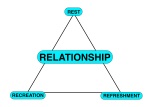STRESS – Senseless Thoughts Repeated Endlessly Surrounding Self
One definition of stress given in the Merriam-Webster Dictionary is “a physical, chemical, or emotional factor that causes bodily or mental tension and may be a factor in disease causation”.
One definition that I propose is “Senseless Thoughts Repeated Endlessly Surrounding Self”. In this definition, I am only considering emotional factors that cause bodily or mental tension but I acknowledge that there are other factors and that these factors are interrelated.
Consider how often in your day you can relate your stress to your mental thoughts and the emotions that those thoughts elicit. Our thoughts have a profound effect on our physical and emotional well-being.
If your thoughts center around negative self-talk, the potential results will be a negative self-image and self-limiting beliefs that will not only increase poor performance but will also add to a sense of defeat and despair or depression.
Persons who feel that they have options are better able to confront challenges in logical and systematic terms. A perceived lack of options leads to feeling trapped which sets off the “fight or flight” response and a whole set of chemical and hormonal reactions in the body that add to or create stress and tension.
We can create our reality with our thoughts. By this, I am not affirming magical thinking. Our reality is based in our thoughts. If I see the glass half-empty I am in a paradigm that is different from seeing the glass half-full. Positive thoughts lead to positive beliefs, positive chemical and emotional reactions in our bodies, and positive actions which lead to positive outcomes.
When our thoughts are negative, it is good to examine why they are negative and determine how the outlook can be changed. There are, indeed, negative things going on all around us. It is how we perceive these challenges and respond to them that determines our levels of stress.
I must also point out that stress in and of itself is not a bad thing. The “fight or flight” response is important in dealing with a dangerous situation! But chronic stress has a toll on our emotional and physical well-being!
Thoughts that are senseless (not based on reality or fact) are not productive. They are harmful and cause undue stress. The stress is compounded when the senseless thoughts are about the self. Senseless thoughts such as negative self-talk and self-limiting beliefs must be eliminated and replaced with thoughts that are based in fact.
If, however, you are having negative thoughts that are based in fact, then solutions to turn the negative facts into positive facts needs to be addressed. Example: “I can’t succeed because I’m not smart enough.” First, it is good to recognize the truth for what it is. Second, while it may be true that this person doesn’t have the skills in the present situation to succeed, the response should not be defeat or despair. The response should be, “How do I acquire the skills needed for success in this field or what field do my natural talents lend themselves to?” This takes a large amount of stress off the person, because instead of feeling helpless, the person feels empowered to make choices!
We can choose to see the glass as half-empty or half-full. We can choose our paradigm. It takes practice and persistence to choose positive thoughts. It takes self-knowledge, insight, and courage to step out of our comfort zone. Sometimes, it takes another person to help us see where are thoughts are “Senseless Thoughts Repeated Endlessly Surrounding Self”!
For help in discerning senseless thoughts and ways to overcome them, feel free to contact me!
To your success!




 Posted by Pearls of Wisdom Consulting Services, PLLC
Posted by Pearls of Wisdom Consulting Services, PLLC 
